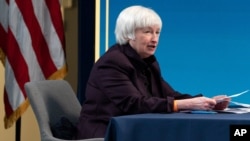U.S. Treasury Secretary Janet Yellen said Sunday it “will take years” to get the country’s coronavirus-ravaged economy back on track if Congress fails to enact President Joe Biden’s $1.9 trillion relief package, rejecting Republican claims that it is too big.
Yellen told CNN that with passage of the relief deal, the economy could return to what is considered full employment in the world’s biggest economy by 2022, with a 4% jobless rate compared to the 6.3% rate in January.
“There’s tremendous suffering in the country,” she said, with nearly 10 million jobs lost in the coronavirus pandemic and a reported 4 million workers who have given up looking for new work. The government reported Friday that the United States added only 49,000 jobs in January.
Both chambers of Congress, each narrowly controlled by Biden’s Democratic Party, voted last week for budget rules that, if necessary, would allow Democrats to push through the new spending on party-line votes in both the Senate and House of Representatives without any support from Republican lawmakers.
Biden told reporters Friday, “I’ve told both Republicans and Democrats, that’s my preference, to work together.”
“But if I have to choose between getting help right now to Americans who are hurting so badly and getting bogged down in a lengthy negotiation or compromising on a bill that’s up to the crisis, that’s an easy choice,” the president said. “I’m going to help the American people who are hurting now.”
Based on the country’s slow recovery from the Great Recession in 2008 and 2009, Biden said, “One thing we learned is, you know, we can’t do too much here. We can do too little. We can do too little and sputter.”
Top White House advisers are hoping to pass the Biden proposal by the first week of March, ahead of a March 15 deadline when current $300-a-week extra payments from the national government to jobless workers on top of less generous state benefits are set to expire. Biden wants to increase the extra federal payments to $400 a week through September.
A group of 10 Republican senators met with Biden at the White House last week, lobbying to keep the payments at $300 a week but ending them in June.
Biden also plans to send $1,400 checks to millions of adult Americans, but Yellen said precise details of what income level the payments would be cut off have yet to be worked out.
Republicans opposed to Biden’s relief package are pointing to an opinion article published in The Washington Post last week by former Treasury Secretary Lawrence Summers, a Democrat, suggesting that the size of Biden’s relief deal could “set off inflationary pressures of a kind we have not seen in a generation.”
Republican Senator Pat Toomey of Pennsylvania, in a CNN interview, said the U.S. is not facing “an economy in collapse.”
He said it is too soon to enact another big coronavirus relief measure.
“The ink is hardly dry on the last bill,” Toomey said, referring to a $900 billion package that then-President Donald Trump approved in late December.
Toomey said that while Biden has “made great speeches on (political) unity, he’s governing from the hard left.”






